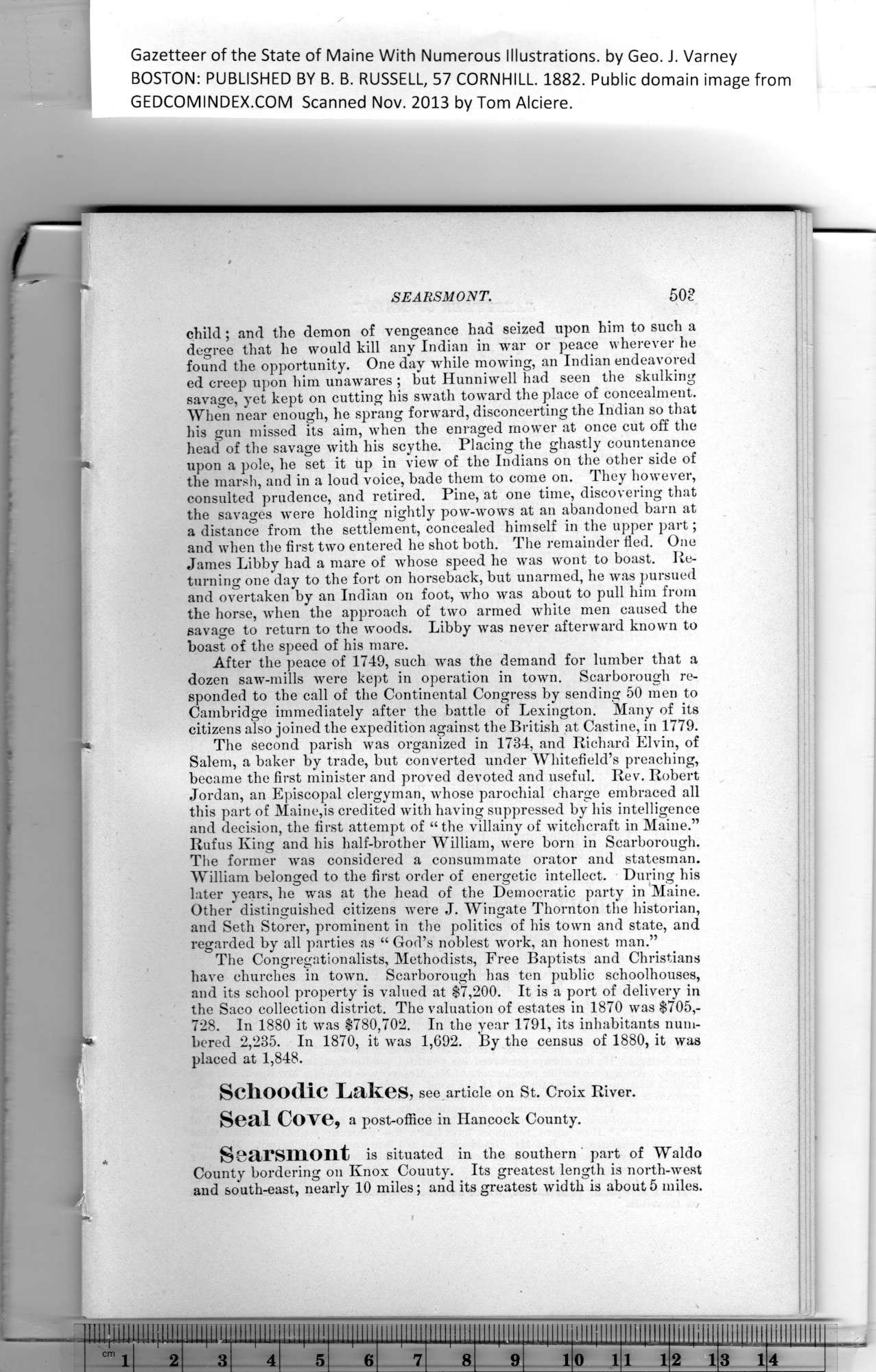|
Gazetteer of the State of Maine With Numerous Illustrations, by Geo. J. Varney
BOSTON: PUBLISHED BY B. B. RUSSELL, 57 CORNHILL. 1882. Public domain image from
SEARSMONT. 50 2
child; and the demon of vengeance had seized upon him to such a
degree that he would kill any Indian in war or peace wherever he
found the opportunity. One day while mowing, an Indian endeavored
ed creep upon him unawares ; but Hunniwell had seen the skulking
savage, yet kept on cutting his swath toward the place of concealment.
When near enough, he sprang forward, disconcerting the Indian so that
his gun missed its aim, when the enraged mower at once cut off the
head of the savage with his scythe. Placing the ghastly countenance
upon a pole, he set it up in view of the Indians on the other side of
the marsh, and in a loud voice, bade them to come on. They however,
consulted prudence, and retired. Pine, at one time, discovering that
the savages were holding nightly pow-wows at an abandoned barn at
a distance from the settlement, concealed himself in the upper part;
and when the first two entered he shot both. The remainder fled. One
James Libby had a mare of whose speed he wras wont to boast. Re-
turning one’day to the fort on horseback, but unarmed, he was pursued
and overtaken by an Indian on foot, who was about to pull him from
the horse, when the approach of two armed white men caused the
savage to return to the woods. Libby was never afterward known to
boast of the speed of his mare.
After the peace of 1749, such was the demand for lumber that a
dozen saw-mills were kept in operation in town. Scarborough re-
sponded to the call of the Continental Congress by sending 50 men to
Cambridge immediately after the battle of Lexington. Many of its
citizens also joined the expedition against the British at Castine, in 1779.
The second parish was organized in 1734, and Richard Elvin, of
Salem, a baker by trade, but converted under Whitefield’s preaching,
became the first minister and proved devoted and useful. Rev. Robert
Jordan, an Episcopal clergyman, whose parochial charge embraced all
this part of Maine,is credited with having suppressed by his intelligence
and decision, the first attempt of “the villainy of witchcraft in Maine.”
Rufus King and his half-brother William, were born in Scarborough.
The former was considered a consummate orator and statesman.
William belonged to the first order of energetic intellect. During his
later years, he was at the head of the Democratic party in 'Maine.
Other distinguished citizens were J. Wingate Thornton the historian,
and Seth Storer, prominent in the politics of his town and state, and
regarded by all parties as “ God’s noblest work, an honest man.”
The Congregationalists, Methodists, Free Baptists and Christians
have churches in town. Scarborough has ten public schoolhouses,
and its school property is valued at $7,200. It is a port of delivery in
the Saco collection district. The valuation of estates in 1870 was $705,-
728. In 1880 it was $780,702. In the year 1791, its inhabitants num-
bered 2,235. In 1870, it was 1,692. By the census of 1880, it was
placed at 1,848.
Schoodic Lakes, see article on St. Croix River.
Seal Cove, a post-office in Hancock County.
Soars m out is situated in the southern part of Waldo
Countv bordering on Knox Couuty. Its greatest length is north-west
and south-east, nearly 10 miles; and its greatest width is about5 miles.
PREVIOUS PAGE ... NEXT PAGE
This page was written in HTML using a program written in Python 3.2
|
